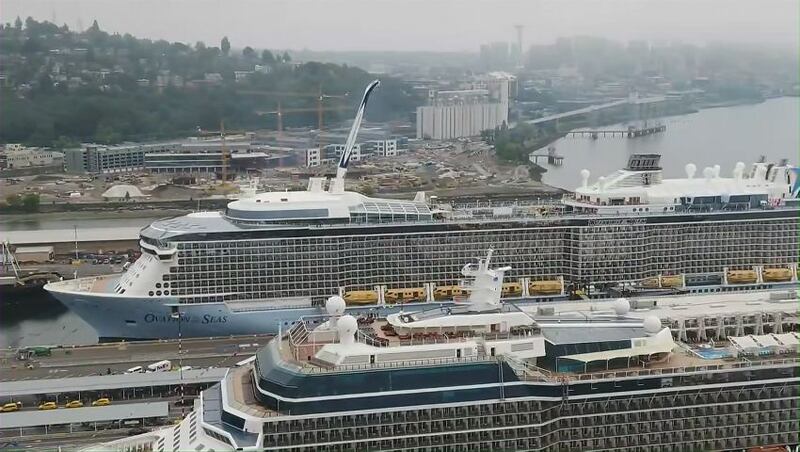The Seattle cruise season was hit with a major blow Thursday after Canada’s minister of transport announced a continued ban on any pleasure craft and cruise ships from entering any Canadian Arctic waters until February 2022.
It marks the second year in a row that Seattle’s roughly billion-dollar cruise season has been canceled.
Canada made the decision to make sure Canadians and transportation workers would be safe during the pandemic.
“As Canadians continue to do their part to reduce the spread of COVID-19, our government continues to work hard to ensure Canada’s transportation system remains safe. Temporary prohibitions to cruise vessels and pleasure craft are essential to continue to protect the most vulnerable among our communities and avoid overwhelming our health care systems. This is the right and responsible thing to do,” said minister of transport, the honorable Omar Alghabra.
Canada already had temporary measures in place, and those were scheduled to end on Feb. 28.
The big reason why it impacts Seattle is that there is no getting to Alaska without stops being made in Canada. The Passenger Vessel Services Act requires ships that are not U.S. built and primarily American operated to stop at a foreign port between U.S. ports, which is Canada.
And with the ban, local businesses are concerned. They will be affected because they rely on crowds of tourists who spend money.
When asked about the news, Ivar’s President Bob Donegan said he was “disappointed.”
Donegan said COVID-19 and the canceled 2020 cruises made their Seattle waterfront fish bar the poorest performing of their 19 seafood bars that are open.
“Last year, 2020, without 1.3 million cruise passengers, the number of people who visited the waterfront will be less than 1 1/2 million people,” Donegan said.
It is sharply down from the 6.3 million people he said bought something from one of the dozens of waterfront businesses in 2019.
“We closed the Acres of Clams restaurants for the winter on Sept. 27 and we hoped that there would be cruises this summer so there would be enough visitors to reopen by Memorial Day,” said Donegan.
However, Donegan’s hopes appear to be dashed.
“Each of those vessels means about $4 million in local economic activity and this means about 5,500 jobs locally,” said Port of Seattle spokesman Peter McGraw.
However, the Port of Seattle said, “there remains a possibility of a limited cruise season in Seattle this year,” but they are awaiting further guidance from the Centers for Disease Control and Prevention.
McGraw said in a full statement:
“We respect the decision by the Canadian government to continue the suspension of cruise vessels in their waters. This impacts our homeported cruises which would stop at a Canadian port, per the Passenger Vessel Services Act, on their Alaska itineraries.”
“There remains a possibility of a limited cruise season in Seattle this year, nonetheless, the health and safety of our community comes first, and we await further guidance from the U.S. Center for Disease Control (CDC). We will continue working closely with federal and local officials and our industry partners to implement the latest health and safety requirements to support a safe return of cruise. When it is safe to cruise Seattle will be ready.”
“The Port of Seattle will also continue its focus on the economic crisis in our community. The safe return of cruise matters not just to the Port, but to the 5,000 people who make income on it each year. Each homeported vessel brings in over $4 million to the regional economy, $14.5 million in statewide taxes, and generates nearly one-billion dollars in business activity over the whole season.”
“We also hear from port cities in Alaska that losing another year of revenue could be cataclysmic. We urge our federal leaders to consider relief for all communities impacted by the declines in travel and tourism. These opportunities matter as we seek an equitable economic recovery.”
“During this time of uncertainty, we want to thank those who continue to prepare for a safe return of cruise, including cruise lines which have proposed some of the most robust health and safety measures among any travel industry. In the meantime, we will continue to work with our state and local health authorities, guidance from the CDC, our cruise customers and local stakeholders, so that we can once again deliver a world-class cruise experience when safe to do so.”
Donegan said, “We’ll work hard to make sure that there’s some cruise season in Seattle this summer.”
Holland America Line told KIRO 7 it is disappointed in Canada’s extended ban, saying “if not amended as pandemic conditions improve, or through actions by U.S. authorities, would require us to cancel our Alaska (West Coast) and Canada/New England (East Coast) cruise vacation seasons this year.”
As for what vessels are barred, Canadian officials said passenger vessels carrying more than 12 people will continue to be prohibited from entering Arctic coastal waters, and cruise vessels with 100 or more people will not be able to operate in Canadian waters.
Officials said cruise ships that enter the waters pose risks to Canada’s health system.
Anyone who does not comply with the measures could be hit with a penalty, which could cost anywhere from $5,000 per day for individuals to $25,000 for groups or corporations, including possible imprisonment if found liable.
In response to Canada’s decision, Alaska’s congressional delegation said the decision is not only unexpected but unacceptable. They said they are exploring all avenues, including changing existing laws to ensure there is a cruise season.
Cox Media Group








